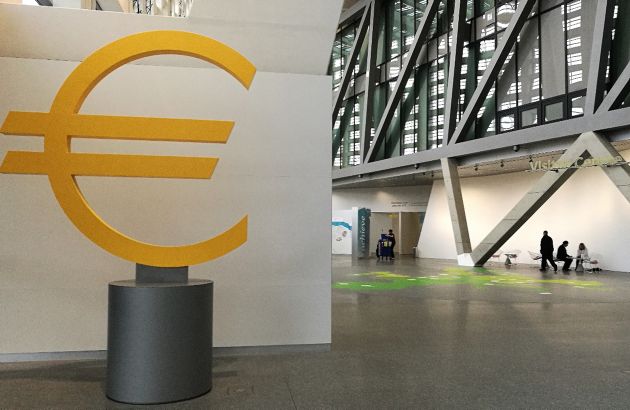-
 Podcast - How much is Greece getting out of the RRF?
Podcast - How much is Greece getting out of the RRF?
-
 Podcast - Between investment grade and rule of law: Greece's contrasting images
Podcast - Between investment grade and rule of law: Greece's contrasting images
-
 Where is Greek growth coming from?
Where is Greek growth coming from?
-
 Bravo, Bank of Greece
Bravo, Bank of Greece
-
 Podcast - A year on from Tempe train crash, trust fades as questions mount
Podcast - A year on from Tempe train crash, trust fades as questions mount
-
 Podcast - SYRIZA embraces the chaos
Podcast - SYRIZA embraces the chaos
QE arrives for Greece

These are extraordinary times. As the saying goes, they also require extraordinary measures and unexpected decisions. What past crises could not achieve, and where decision-makers wavered or delayed, the advent of the coronavirus has triggered.
The emerging reality around us beats our wildest fantasies. Who would have imagined that within a few days Greece would receive a twin crisis response from European policy makers that appeared politically impossible only a fortnight ago? Today, Greece is freed from adhering to the primary surplus target of 3.5 percent of annual GDP. Moreover, the European Central Bank’s (ECB) Pandemic Emergency Purchase Programme (750 billion euros), launched on March 19, now includes the purchase of sovereign and corporate bonds from all euro areas member states; thus including Greece (approximately totaling 12 billion euros). This effectively means that Greece is now a participant country in the ECB’s new QE programme, albeit under the auspices of a different name defined by the coronavirus.
For the ECB to start purchasing Greek sovereign bonds the institutional hurdle of the waiver was overcome within 24 hours. During the country’s sovereign debt crisis and even after the termination of the third macro-economic adjustment programme in 2018, the waiver obstacle proved controversial among policy makers and insurmountable in practice. Now, this institutional impediment has dissolved in no time as the virus is spreading across Greece and Europe.
The ECB’s extraordinary action underlines that whatever limits to monetary policy may exist do not count at present. While self-isolation is a necessary action for us citizens under the current dire circumstances, policy makers at the ECB in Frankfurt illustrate that self-limitations in monetary policy are currently and, in the months to come, self-destructive. They would have unintended and immediate adverse side effects for the political economy of the entire euro zone.
The coronavirus pandemic is reintroducing the rhetoric of “bazookas,” which were previously brought into firing position during the financial and sovereign debt crises of 2008 and later. The ECB’s new bazooka immediately countered rising yields of highly indebted countries such as Italy, Spain and Greece that had spiked in the course of the past two weeks. Only five weeks ago - on February 12 - the yield on Greek 10-year debt had fallen below the symbolic threshold of one percent. This record decline in borrowing costs was followed by an equally dramatic turnaround in yields for Greek debt within the past three weeks.
As the Greek case illustrates, and similar developments can be observed in Italy and Spain, epic bond rallies can turn in the opposite direction when a so-called “black swan” event occurs and infects all fissures of the economy and capital markets, domestically and at the international level. Under these challenging circumstances it is a blessing in disguise that policy-makers in Athens, from the Finance Ministry to the Public Debt Management Agency (PDMA), had pro-actively issued various medium- to long-term sovereign debt in the course of the past months. This debt issuance, including a 15-year bond totaling 2.5 billion euro in late January 2020, put the government in a position to meet its near-term funding needs.
The additional funding requirements will be considerable. But going to capital markets under the present volatility conditions would be near impossible. This obstacle was immediately understood by the authorities in Athens and communicated to the ECB as a matter of urgency. Hence, the dramatic decision to include Greece – for the first time – in the ECB’s Pandemic Emergency Purchase Programme, aka. Quantitative Easing (QE) measures.
Given what is at stake in Greece and across Europe, the coronavirus pandemic does not leave policy-makers with ample time and sufficient, reliable information for their decisions. The current pandemic does not allow for that kind of certainty. Nobody knows how long this will go on for, how much economic activity will be curtailed, and how much (permanent) damage will be done. The future is completely unknown.
But the time is now! How the medicine of the ECB’s purchase programme will alleviate the medium-term situation remains to be seen. But as we learnt from earlier attempts and remedies, one does not fight a financial virus, let alone a pandemic with a band aid. Neither does one distinguish between euro area member states. Everybody needs to be on board, including Greece.
*Jens Bastian is an independent economic analyst and financial sector consultant, based in Athens, Greece